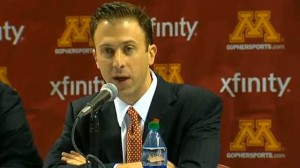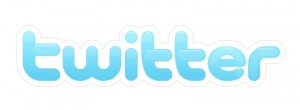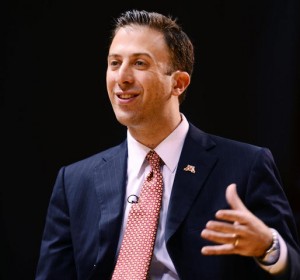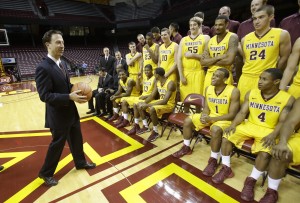I asked University of Minnesota Golden Gophers Coach Richard Pitino about the top trending topic in college basketball this week- that would be Twitter. Quite a few big name college hoops coaches publicly discussed social media and the adverse effect it’s having on their programs and players. Following the Golden Gophers 54-48 win at Northwestern, Richard Pitino gave a very colorful and insightful answer to my question.
First a little background. Michigan State Coach Tom Izzo got this party started on Monday by saying he hates Twitter, and that he’s a proud social media basher on the Big Ten coaches conference call. Then Izzo doubled down on his comments the very next day when having a session with his local media.
ESPN College Gameday came to Lexington Saturday morning, and John Calipari discussed how he hired someone to run his Twitter account for him, and that he never reads any of the @mentions he receives on the micro-blogging platform. Coach Cal also talked about how much Twitter amplifies everything and that he can’t care about what people who’ve never met him think about him and his team.
Saturday night, Ohio State Coach Thad Matta brought up the negative effects of living in a 140 or less character world in his press conference after Ohio State won at Illinois. This was very odd, as the question posed to Matta was about the terrible season the Illini are having. It had nothing to do with Twitter. Weird, it’s almost like there was a coaches summit held somewhere, and they decided to set this topic as the main talking point of the week.
(That’s a joke of course! I don’t actually believe they colluded to have an public roll-out of their anti-social media agenda)
“Twitter is anti-team in my opinion, it really is,” Richard Pitino said.
“I think it’s changed the whole game in all of sports, for a lot of the wrong reasons. It’s not good for us, for any of them. It’s not healthy to have one player with 5,000 followers and another player with 800 followers. It’s not healthy that they go to their phones all the time, looking for their mentions. I understand that for you guys (the working media) it’s a vehicle and you need to do it, but I don’t like it one bit. I understand it, but I don’t like it.
I think it creates a feeling that one guy is a celebrity.”
Richard Pitino is only 31 years old, and therefore one of the youngest head coaches in college basketball. He’s more hip with the new communication technology than some of your older generation coaches. I then asked a follow up question, does Pitino have any phone and/or social media restrictions for his players?
“I don’t. I just talk to them about a.) not buying into the non-sense and b.) don’t tweet about what you had for dinner, nobody cares.”
“Don’t tweet about where you are, nobody cares.”
“We’re not interested in what restaurant you’re going to or what movie you’re watching, but you got to let them be themselves too now.”
“I’m 31 years old, and as a benefit of me being young I understand it, and it’s a distraction, even for me it’s a distraction. You try to block it out as much as possible though.”
Richard Pitino gave some really solid advice.
Not just for college basketball programs, but for every person with a Twitter account. You know how many times I’ve wanted to tweet “don’t care,” or even “DON’T CARE” at the people I follow for making those same types of boring, pointless and inane tweets that Richard Pitino is talking about.
Paul M. Banks owns The Sports Bank.net, an affiliate of Fox Sports. An MBA and Fulbright scholar, he’s also a frequent analyst on news talk radio; with regular segments on ESPN,NBC, CBS and Fox. A former NBC Chicago and Washington Times writer, he’s also been featured on the History Channel. President Obama follows him on Twitter (@paulmbanks)




